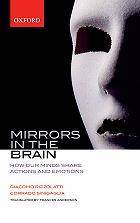Mirrors in the Brain : How our Minds Share Actions, Emotions and
Rizzolatti, Giacomo
Éditeur : OXFORD UNIVERSITY PRESS
ISBN papier: 978019217984
Parution : 2007
Code produit : 1068882
Catégorisation :
Livres /
Sciences humaines /
Psychologie /
Ouvrages généraux
Formats disponibles
| Format | Qté. disp. | Prix* | Commander |
|---|---|---|---|
| Livre papier | En rupture de stock** |
Prix membre : 54,10 $ Prix non-membre : 56,95 $ |
*Les prix sont en dollars canadien. Taxes et frais de livraison en sus.
**Ce produits est en rupture de stock mais sera expédié dès qu'ils sera disponible.
Description
Presents a fascinating account of one of the defining scientific discoveries of the past 50 years, from the man who made the breakthrough Explains in a clear and accessible style how mirror neurons enable us to share experiences of emotions, movements, and feelings Emotions and actions are powerfully contagious; when we see someone laugh, cry, show disgust, or experience pain, in some sense, we share that emotion. When we see someone in distress, we share that distress. When we see a great actor, musician or sportsperson perform at the peak of their abilities, it can feel like we are experiencing just something of what they are experiencing. Yet only recently, with the discover of mirror neurons, has it become clear just how this powerful sharing of experience is realised within the human brain. This book provides, for the first time, a systematic overview of mirror neurons, written by the man who first discovered them. In the early 1990's Giacomo Rizzolatti and his co-workers at the University of Parma discovered that some neurons had a surprising property. They responded not only when a subject performed a given action, but also when the subject oberved someone else performing that same action. These results had a deep impact on cognitive neuroscience, leading the neuroscientist VS Ramachandran to predict that 'mirror neurons would do for psychology what DNA did for biology'. The unexpected properties of these neurons have not only attracted the attention of neuroscientists. Many sociologists, anthropologists, and even artists have been fascinated by mirror neurons. The director and playwright Peter Brook stated that mirror neurons throw new light on the mysterious link that is created each time actors take the stage and face their audience - the sight of a great actor performing activates in the brain of the observer the very same areas that are active in the performer - including both their actions and their emotions. Written in a highly accessible style, that conveys something of the excitement of this groundbreaking theory, Mirrors in the brain is the definitive account of one the major scientific discoveries of the past 50 years. Readership: Neuroscientists, Psychologists, and Philosophers from undergraduate level upwards.























